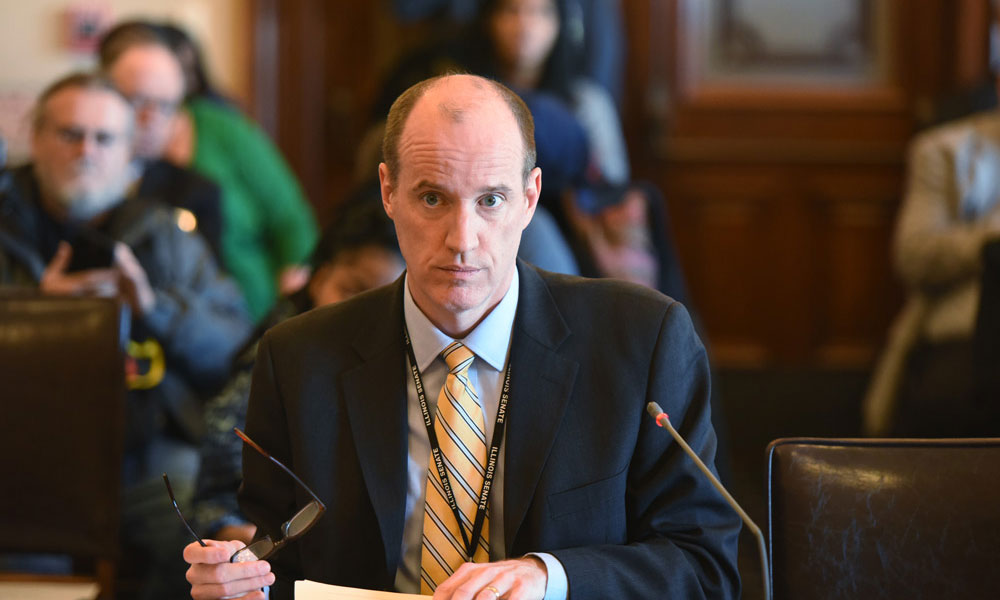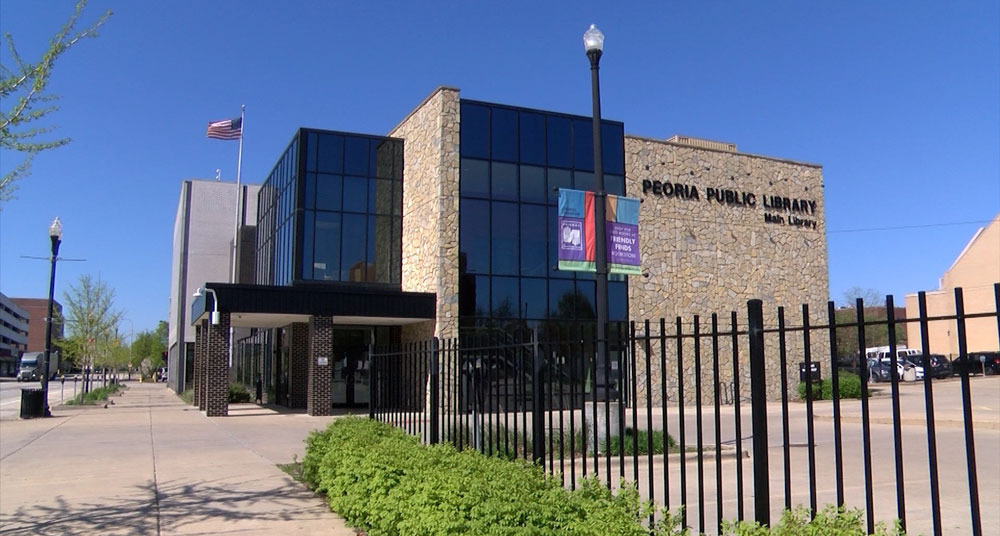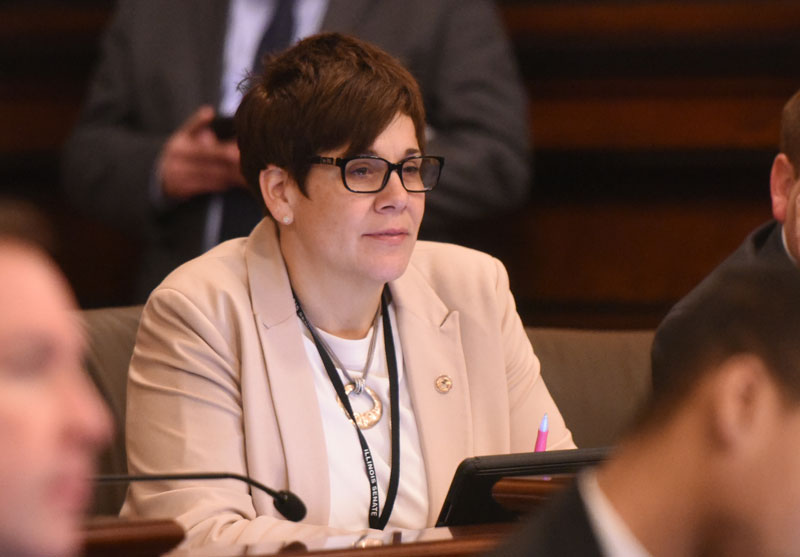- Details
- Category: Senator Bill Cunningham News
 CHICAGO – The Chicago Ridge Public Library is the recipient of a $9,000 mentoring grant from the Illinois secretary of state, State Senator Bill Cunningham announced.
CHICAGO – The Chicago Ridge Public Library is the recipient of a $9,000 mentoring grant from the Illinois secretary of state, State Senator Bill Cunningham announced.
The grant was awarded through the Fiscal Year 2021 Project Next Generation program, which is a mentoring program administered through Illinois public libraries. Mentors work with middle and high school students to help them develop skills needed to use technology and find success through project-based learning. Mentors also help with developing life skills, such as effective communication, goal setting and conflict resolution.
Chicago Ridge is one of 28 public libraries in the state to receive the grant.
“This program will help the young people of Chicago Ridge develop the skills they need for the future,” said Cunningham, a Democrat who represents portions of Chicago and the southwest suburbs. “It’s especially important to provide more opportunities to disadvantaged youth.”
In all, the secretary of state awarded more than $550,000 in Project Next Generation grants statewide. The money is provided by the Institute of Museum and Library Services. Grants are awarded to public libraries that serve culturally diverse, low-income and underserved populations.
“I am committed to improving the lives of at-risk youth in Illinois,” said White. “I established this innovative program when I first became Secretary of State to give students an opportunity to receive hands-on experience with the latest technological tools at their local library.”
- Details
- Category: Senator Christopher Belt News
 Lawmakers concerned by low response rates in St. Clair County
Lawmakers concerned by low response rates in St. Clair County
EAST ST. LOUIS – With time running out to count households and St. Clair county recording low response rates, State Senator Christopher Belt (D-Centreville) and State Senator Rachelle Crowe (D-Glen Carbon) encourage Metro East residents to complete the 2020 Census.
“We have to fill out the census before it's too late,” Belt said. “This simple action determines so much about the resources provided to our community. This is the first step in solving injustices, in public health, racial equity and even law enforcement. The Census Bureau needs the most accurate data in order to help us help ourselves.”
“To ensure our region is counted efficiently and allotted the necessary federal aid, every household is responsible for completing the census,” Crowe said. “If your household has responded, you can help by talking to your family members, friends and neighbors about how simple it is. It takes minutes to complete and makes a difference in our communities for years to come.”
Seven municipalities in St. Clair County and one in Madison County have a rate of 49.9% or lower on the statewide response rate list. The cities and villages included by name and rate listed are:
- Washington Park – 31.4%
- Brooklyn – 39.1%
- Venice (Madison County) – 41.9%
- Alorton – 43.1%
- East St. Louis – 44.2%
- Centreville – 49.4%
- Fairmont City – 49.7%
- Cahokia – 49.9%
Residents can complete the census for their household at www.my2020census.gov.
- Details
- Category: Senator Scott Bennett News
 CHAMPAIGN – State Senator Scott Bennett (D-Champaign) is urging motorists to use caution as construction begins on Interstate 72 between White Heath (Exit 169) and Interstate 57 at Champaign (Exits 182A-B).
CHAMPAIGN – State Senator Scott Bennett (D-Champaign) is urging motorists to use caution as construction begins on Interstate 72 between White Heath (Exit 169) and Interstate 57 at Champaign (Exits 182A-B).
“It’s critical that we keep moving forward with road projects to help improve our community’s transportation infrastructure,” Bennett said. “These investments are essential to keeping people safe and giving the economy a much-needed boost.”
The $8.3 million Rebuild Illinois project involves 11 miles of pavement patching and resurfacing and will require lane closures starting Aug. 12, with one lane open in each direction at all times. Weather permitting, work on this project is expected to be complete by the end of November.
Bennett is warning motorists to expect delays and allow extra time for trips through this area. He is also encouraging motorists to avoid the work area when feasible and consider using alternate routes. Drivers are urged to drive cautiously in and near work zones, and to always buckle up and put phones down.
“It is important for everyone to do their part to be mindful of workers and improve work zone safety,” Bennett said. “Driving too fast may shave a minute off your travel time, but it could cost a worker their life. Please stay alert in construction zones.”
To view area construction details, visit IDOT’s traveler information map on GettingAroundIllinois.com.
- Details
- Category: Senator Dave Koehler News
 PEORIA – The Peoria Public Library and is the recipient of a $12,500 mentoring grant from the Illinois secretary of state’s office, State Senator Dave Koehler (D-Peoria) announced Tuesday.
PEORIA – The Peoria Public Library and is the recipient of a $12,500 mentoring grant from the Illinois secretary of state’s office, State Senator Dave Koehler (D-Peoria) announced Tuesday.
The grant was awarded through the Project Next Generation program, which is a mentoring program administered through Illinois public libraries. Mentors work with middle and high school students to help them develop skills needed to use technology and find success through project-based learning. Mentors also help with developing life skills, such as effective communication, goal setting and conflict resolution.
The Peoria Public Library is one of 28 public libraries in the state to receive the grant.
“I’m thrilled to see that Secretary White is demonstrating a commitment to the wellbeing of public libraries in our state,” Koehler (D-Peoria) said. “Well funded libraries are an invaluable resource for our communities. This grant will help provide students in Peoria with the tools they need to be successful in the future.”
In all, the secretary of state awarded $559,358.00 in Project Next Generation grants statewide. The money is provided by the Institute of Museum and Library Services. Grants are awarded to public libraries that serve low-income and underserved populations.
- Details
- Category: Senator Don Harmon News
 SPRINGFIELD – Senate President Don Harmon (D-Oak Park) announced $1.7 million for new energy efficient windows at Triton College in River Grove.
SPRINGFIELD – Senate President Don Harmon (D-Oak Park) announced $1.7 million for new energy efficient windows at Triton College in River Grove.
This investment is made possible by the historic, bipartisan Rebuild Illinois capital plan the Senate passed in 2019.
“Our ability to continue to invest in our communities through the Rebuild Illinois plan is a bright spot in the midst of the economic devastation caused by the coronavirus pandemic,” Harmon said. “It is critical that we invest in our educational institutions now so that they are able to serve Illinoisans for years to come as our state recovers.”
Read more: Harmon announces $1.7 million for infrastructure improvements at River Grove college
- Details
- Category: Senator Jennifer Bertino-Tarrant News
 PLAINFIELD — To help families searching for relief amid the COVID-19 pandemic, State Senator Jennifer Bertino-Tarrant (D-Shorewood) is highlighting additional unemployment benefits and rental assistance for families who are still struggling.
PLAINFIELD — To help families searching for relief amid the COVID-19 pandemic, State Senator Jennifer Bertino-Tarrant (D-Shorewood) is highlighting additional unemployment benefits and rental assistance for families who are still struggling.
“The public health crisis has led to severe financial losses for thousands of Illinois families, at no fault of their own,” Bertino-Tarrant said. “These programs will help Illinoisans begin to bounce back from their hardships by ensuring they don’t have to worry about how they will be able to keep a roof over their heads.”
The Illinois Housing Development Authority is offering support through the Emergency Rental Assistance program for renters who are at risk of homelessness when the moratorium on evictions expires later this month.
To be eligible for the program, applicants must have fallen behind on their rent since March 1 and must be able to demonstrate income losses as a result of the COVID-19 crisis.
Applications open Aug. 10 at 9 a.m. and will be available at ERA.IHDA.org. The application period will close no later than Aug. 21. However, it may close earlier if IHDA receives an overwhelming number of applications, so renters are encouraged to apply as early as possible. Successful applicants will be notified within 2-3 weeks of submitting their forms.
While applications are only available online, community partners are available to help people who cannot complete an application over the internet. A list of these partners will soon be available in the Resources section of the program’s website and at (888) 252-1119.
An Emergency Mortgage Assistance program will launch later this month to assist homeowners who are struggling financially.
Additionally, the Illinois Department of Employment Security announced Thursday that 20 weeks of state extended benefits are available to people who exhaust the allotted 26 weeks of regular state unemployment and the additional 13 weeks of federal Pandemic Emergency Unemployment Compensation benefits.
People with questions or those who need assistance with unemployment benefits should visit IDES.Illinois.gov.
- Details
- Category: Senator Scott Bennett News
 CHAMPAIGN – A measure co-sponsored by State Senator Scott Bennett (D-Champaign) that increases public employee benefits, protects retail workers and expands collective bargaining rights was signed into law Friday.
CHAMPAIGN – A measure co-sponsored by State Senator Scott Bennett (D-Champaign) that increases public employee benefits, protects retail workers and expands collective bargaining rights was signed into law Friday.
“Front-line workers have put their own wellbeing on the line to provide essential services during this crisis,” Bennett said. “This new law ensures workers are properly protected as we continue to battle COVID-19.”
Certain state employees, including firefighters, law enforcement and paramedics, would be eligible for an additional 60 days of paid disability leave if their injury recovery has been hindered by difficulties accessing treatment due to the COVID-19 outbreak.
To recognize the essential role retail workers have taken on during this public health emergency, battery of a retail worker would be enhanced to aggravated battery if the worker was performing duties like relaying directions for health care or safety. The enhancement would also set in if the act is committed during a declared disaster or state of emergency due to a public health emergency, and for an additional six months after the declaration.
“Workers do not deserve harassment for enforcing state-issued safety guidelines,” Bennett said. “Expanding legal protections for workers is the right thing to do.”
Senate Bill 471 is effective immediately.
More Articles …
Page 598 of 720













 © 2025 Illinois Senate Democratic Caucus
© 2025 Illinois Senate Democratic Caucus